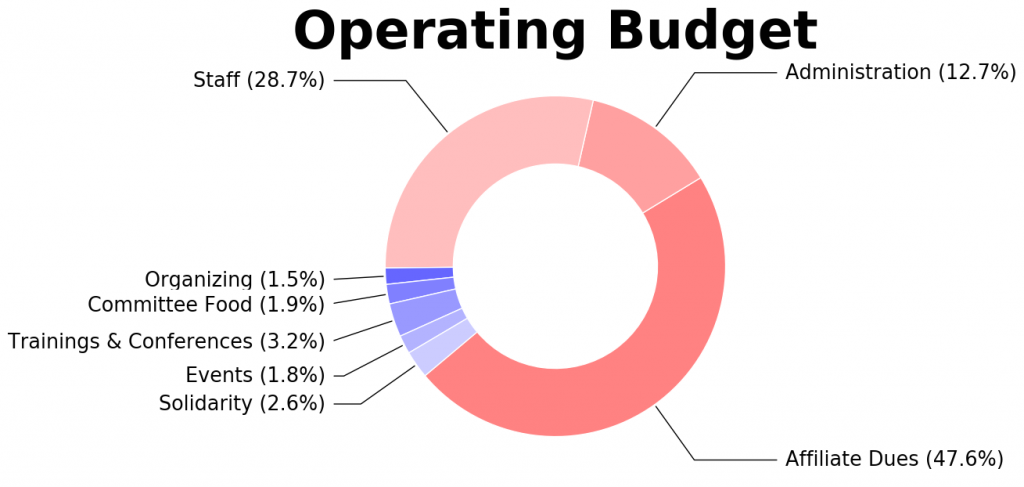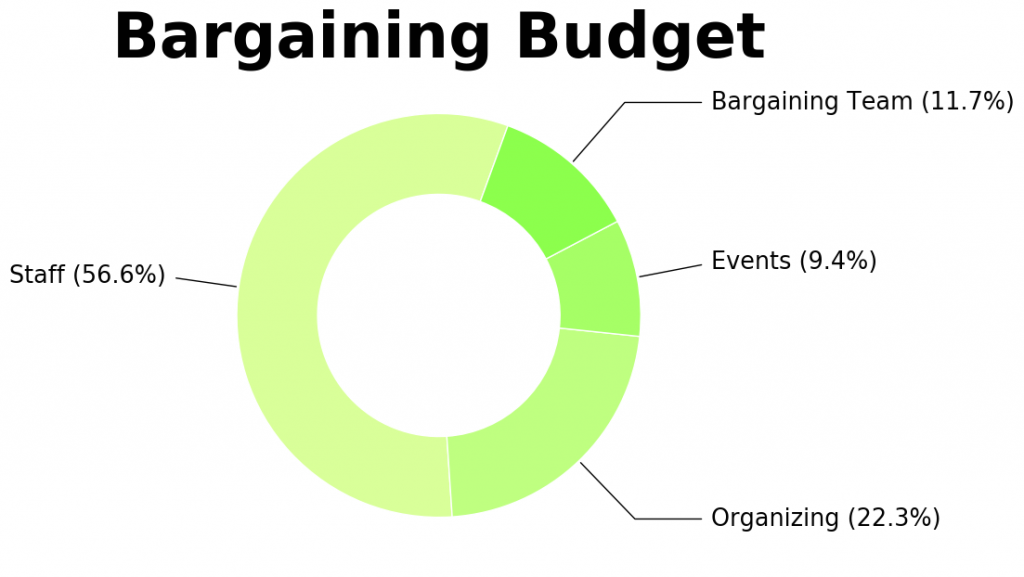The Graduate Employees Union (GEU) is funded by member dues only. That is, we are entirely independent of MSU. We do not receive any funding from the university like COGS or other student organizations. So, when you sign your member card (sign your member card!), and/or sign up as an associate member, you can rest easy knowing that the union is not spending your money on things like sex abuse scandals that were allowed to happen at the university (Szekely, 2018). Or a lawyer for George Perles, board of trustees member, who covered up that sex abuse (Wolcott, 2018). Your money is also not being spent on hedge fund managers making risky investments or skyrocketing interest rates (Banerji, 2018). And your money is definitely not paying for an interim president who has made a career of cutting funding to education (AP, 1993) and also covering up sex abuse (Perkins, 2018).
No, when you join the union, you are making an investment in your job as a graduate employee. You are helping to cover the cost of protecting our contractual rights and bargaining for a new contract. You are making sure that all graduate employees at Michigan State are paid enough to get by and are able to work in a safe harassment free environment. To be clear, the whole reason we (the GEU) exist is because we, as graduate students, are easy to exploit. The university does not pay us as much as we deserve, and our work environment is unfortunately not always safe or harassment free. We have a long way to go and a lot more work to do before we arrive at some avocado toast-eating utopia where manna and finished dissertation chapters fall from heaven. Since our current contract is about to expire–in May, 2019–we wanted to share some of how we are spending the dues you pay as a member in our ongoing work to ensure fair treatment (or at least fair-er treatment) of grad students. The GEU volunteers are not allowed to just make a budget without any oversight though: this budget was approved by the general membership at the spring 2018 general membership meeting.
1. Szekely & Allen. (2018, May 16). Michigan State to pay $500 million to Nassar sex abuse victims. Reuters. Retrieved from www.reuters.com
2. Wolcott. (2018, September 13). Michigan State hiring law firm to assist George Perles in the wake of allegations. Lansing State Journal. Retrieved From www.lansingstatejournal.com
3. Banerji, Kennedy & Senegal. (2018, April). The Financialization of Higher Education at Michigan State University. Roosevelt Institute. Retrieved from www.rooseveltinstitute.org
4. Perkins. (2018, February 1). While governor, John Engler fought hard against prison sex abuse victims. Detroit Metro Times. Retrieved from www.metrotimes.com
5. The Associated Press. (1993, August 21). Michigan Drops Property Taxes For Schools, Prompting Lawsuit. The New York Times. Retrieved from www.nytimes.com

What are all these things you ask?
Starting with our regular operating budget–this is how we are spending dues. We project how much revenue we will get from dues each year, and our regular operating budget is our plan on how to spend that money. We try to not spend any more money than what we take in.
This includes all the boring day-to-day stuff in the administration category like renting office space, paying utilities, buying office supplies and similar sorts of things. This also includes our one regular paid staff, the organizer and contract representative. Our organizer and contract representative finds new members, supports volunteer graduate students who run the union, and enforces our contract with the university. The other big category of spending is our affiliate dues which cover the legal and professional support we receive from the American Federation of Teachers (AFT), our parent union. Graduate students are experts in whatever their area of study is, but that does not make them experts in labor law, and that is what we need AFT for. Besides legal support, AFT also provides trainings for our graduate student volunteers who make the union run.
The smaller (blue) categories represent our discretionary budget. This is what we have control over how we spend. Trainings and Conferences covers training outside of what AFT offers, travel costs, and the training retreats that we organize internally. The Committee Food category includes all the food that we have for graduate student volunteers at some of our regular committee meetings. Food, it turns out, is an excellent motivator to get people to attend meetings. The Solidarity budget is allocated for our solidarity grant. This is a members only benefit for graduate students who are having some kind of unexpected financial emergency. We have helped people with problems ranging from covering rent during an unexpected crisis to ensuring members and their children can afford food and medical care.
The Organizing budget is composed of printed materials we hand out to inform graduate students of their rights as employees and some of the costs associated with enforcing our contract. The Events category is our budget for our general membership meetings. It is important to get the general membership to attend these meetings so that the decisions that are made there are representative of all the members of the union who care how we are doing things. The general membership meetings are where our biggest decisions are made like approving the budget, electing officers, and ratifying our contract. Because these meetings are so important we try to make them fun to go to. We have food, beer and wine for everyone. Please join us at our next general membership meeting–you get a free meal, and you get a say in how the union operates.

Whoa there hoss, whats that other budget I see?
Our bargaining budget. This year (this fiscal year–August 2018 to July 2019) is a special year because our contract is expiring, and we are bargaining for a new one. Since the so called right to work laws were passed in Michigan (the states attempt to break up unions), union membership has gone down. This is because even though the union has continued to work to enforce our contract, making big gains in healthcare and compensation (thanks bargaining team 2015!), there is a lot of turnover in graduate students as people graduate, find jobs, move on to bigger and better things. Every year we need to find all the new graduate employees and ask them to join the union. Grad students are busy people who are hard to find. When we do find them they sometimes don’t know what the union is and don’t understand that all the benefits they have were won, and are maintained by, the union (or that universities with unionized graduate employees are compensated much better on average than non-unionized schools). So, this bargaining budget is a gamble. We are hoping to spend some more money this year from our savings to win an especially good contract and set up structures internally to sustain union membership at a higher level. A lot of thought went into making this decision, and it was not made lightly. The volunteer graduate students on the budget committee are a particularly miserly sort when it comes to spending their hard-earned money, but we decided, and the general membership agreed, that this was a good chance to take.
The biggest part of this budget is paying for the time of a second staff organizer. We have much move leverage in bargaining over the university if our membership is strong, and this year we need a little extra support because of all the extra research committees that are working to prepare to bargain our contract (want to join one? email geu@geuatmsu.org). Just like organizing and events in our regular operating budget, this year we are planning on generating more materials to distribute, and we will need to host extra general membership meetings to keep everyone informed during bargaining of what is going on. Finally, we have a budget set aside for supporting the bargaining team itself. Right now this is allocated for food for the team and support groups.
Questions? email treasurer@geuatmsu.org and come to our GMM on October 12th
